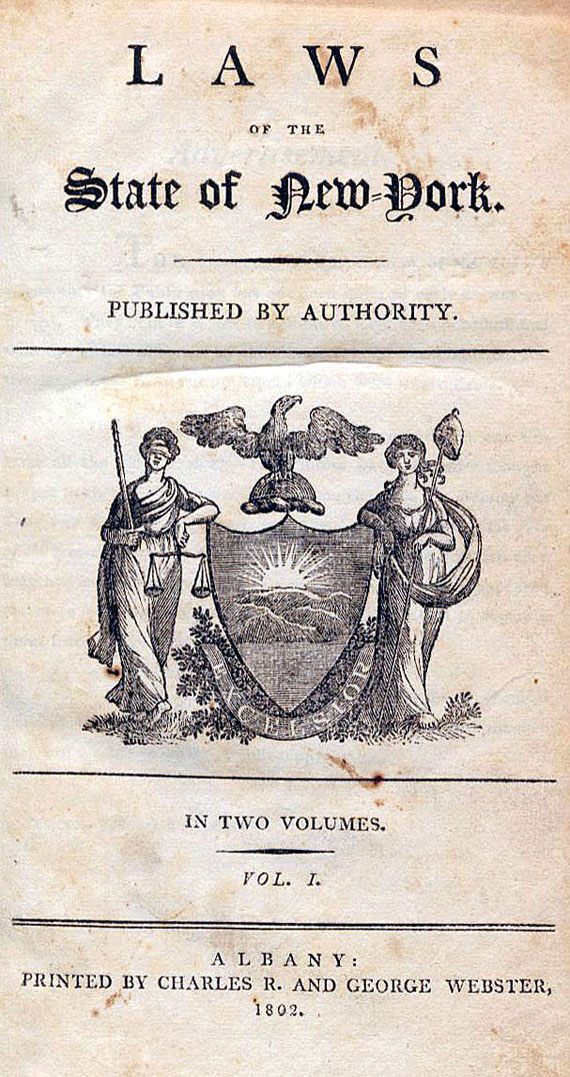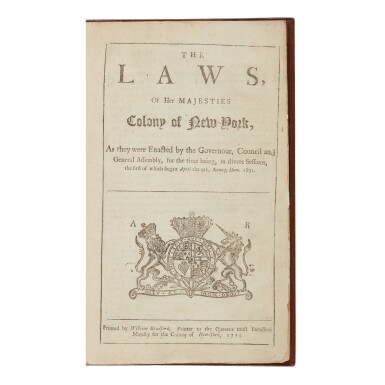NEW YORK] Laws of New-York, from the Year 1691, to 1751, inclusive . New York: James Parker 1752. Compiled by William Livingston and William Smith Jr. First edition. Contemporary calf, remants of red morocco lettering label. 13 1/4 x 8 3/4 inches (33.6 x 21.5 cm); title with woodcut device, list of subscribers bound after the preface, without the errata leaf. Collation: pi^(1) a^(2) 2pi^(2) A-3U^(2) 3X-4X^(4) A-H^(2). Foxing, browning to endpapers, thumbsoiling and a few marginal tears, covers worn, rear board gouged at center and split at lower joint, partial loss to lettering label. Provenance: Christopher Billopp (signature to title); The Province of New Jersey (note to margin of page 101) The first compilation of the laws of colonial New York with an important American Revolution provenance. Christopher Billopp, born in 1738, lived at the 1,600 acre estate at the southern tip of Staten Island known as Bentley Manor, that had been granted to his grandfather in 1676. During the revolution Bentley Manor played host to the unsuccessful Peace Conference between John Adams Benjamin Franklin and British Admiral Lord Richard Howe on September 11, 1776, just days after Washington's narrow escape to Manhattan from the Battle of Long Island. Now known as "The Conference House", at the three hour meeting a sumptuous meal was served and Howe demanded the Declaration of Independence be revoked but the Americans refused. Billopp himself was a staunch loyalist and his personal copy of the colonial laws of New York is a powerful symbol of the political life the "Tory Colonel" fought with all to protect. During the war, Billopp, a man of severe temper who was taken prisoner several times, was ordered tortured by Elias Boudinot, and after the war abandoned Bentley Manor and settled in Canada. A second contemporary note, found in the inner margin of page 101, reads "This book belongs to the Province of New Jersey" a possible original owner of the book. Evans 6897; Sabin 53740. C
NEW YORK] Laws of New-York, from the Year 1691, to 1751, inclusive . New York: James Parker 1752. Compiled by William Livingston and William Smith Jr. First edition. Contemporary calf, remants of red morocco lettering label. 13 1/4 x 8 3/4 inches (33.6 x 21.5 cm); title with woodcut device, list of subscribers bound after the preface, without the errata leaf. Collation: pi^(1) a^(2) 2pi^(2) A-3U^(2) 3X-4X^(4) A-H^(2). Foxing, browning to endpapers, thumbsoiling and a few marginal tears, covers worn, rear board gouged at center and split at lower joint, partial loss to lettering label. Provenance: Christopher Billopp (signature to title); The Province of New Jersey (note to margin of page 101) The first compilation of the laws of colonial New York with an important American Revolution provenance. Christopher Billopp, born in 1738, lived at the 1,600 acre estate at the southern tip of Staten Island known as Bentley Manor, that had been granted to his grandfather in 1676. During the revolution Bentley Manor played host to the unsuccessful Peace Conference between John Adams Benjamin Franklin and British Admiral Lord Richard Howe on September 11, 1776, just days after Washington's narrow escape to Manhattan from the Battle of Long Island. Now known as "The Conference House", at the three hour meeting a sumptuous meal was served and Howe demanded the Declaration of Independence be revoked but the Americans refused. Billopp himself was a staunch loyalist and his personal copy of the colonial laws of New York is a powerful symbol of the political life the "Tory Colonel" fought with all to protect. During the war, Billopp, a man of severe temper who was taken prisoner several times, was ordered tortured by Elias Boudinot, and after the war abandoned Bentley Manor and settled in Canada. A second contemporary note, found in the inner margin of page 101, reads "This book belongs to the Province of New Jersey" a possible original owner of the book. Evans 6897; Sabin 53740. C















Testen Sie LotSearch und seine Premium-Features 7 Tage - ohne Kosten!
Lassen Sie sich automatisch über neue Objekte in kommenden Auktionen benachrichtigen.
Suchauftrag anlegen